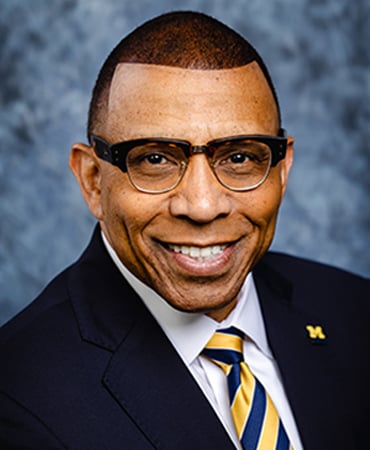office of the chancellor

Meet Chancellor Laurence B. Alexander, JD, Ph.D.

Laurence B. Alexander was named chancellor of the University of Michigan-Flint, May 16, 2024, and took office July 1, 2024. Alexander comes to the downtown campus after serving 11 years as chancellor of the University of Arkansas at Pine Bluff.
Alexander brings more than 30 years of combined professional and academic experience as a university leader, administrator, distinguished professor, First Amendment scholar, attorney, and journalist.
Under his leadership, UAPB grew enrollments, achieved remarkable increases in retention and graduation rates, launched new marketable academic programs, received reaffirmation of 10-year university accreditation by the Higher Learning Commission, reached higher levels of research investment and grant funding, acquired funding for new construction and renovation of capital projects, increased engagement of government officials and community leaders, and developed new corporate partnerships that led to multiple major-gift donations to the university, raising the endowment by 200%.
One year into his UAPB tenure, Alexander led the development and implementation of the bold, visionary and collaborative “Growing the Pride: 2015-2020 Strategic Plan,” which emphasized five priorities: growing enrollment and fostering student success at the undergraduate and graduate levels; optimizing efficiencies; upgrading and expanding facilities; diversifying and increasing revenue streams; and enhancing the university’s reputation and national visibility.
“I’m pleased to become a part of this great university. I’ve been impressed by the people, existing programs, facilities, and the solid foundation that’s been laid by previous leadership, and I can’t wait to build on those things with the experience I’ve gained throughout my career.”
Based on the strategic plan’s priorities and values, Alexander led the university in completing a campus master plan that helped reposition UAPB for large-scale resource development and more significant investment in academic programs, faculty development, experiential learning, and a capital program.
In 2022, Alexander was appointed by President Joe Biden to serve as chair of the Board for International Food and Agricultural Development, an advisory board to the U.S. Agency for International Development that was established to ensure that USAID brings the assets of U.S. universities to bear on development challenges in agriculture and food security and supports their representation in USAID programming. His appointment marked the first time the board was chaired by an 1890 public land grant university leader, acknowledging the valuable contributions of HBCUs and presenting the opportunity to further strengthen USAID’s partnerships with HBCUs and other Minority Serving Institutions. The board supports USAID’s global commitments in agriculture and food systems through initiatives such as the revised U.S. Government Global Food Security Strategy and U.S. Government Global Food Security Research Strategy, responding to climate change and strengthening local systems.
A native of New Orleans, Alexander earned a bachelor’s degree from the University of New Orleans, a master’s degree in journalism and communications from the University of Florida, a Juris Doctor from Tulane University, and a PhD in higher education from Florida State University. His dissertation, “Public Forum Doctrine in Higher Education: Student Rights and Institutional Prerogatives,” was recognized with the national Joseph C. Beckham Dissertation of the Year Award from the Education Law Association.
Before joining UAPB, Alexander served 22 years as a professor and administrator at the University of Florida, the state’s 50,000-plus student land-grant flagship research institution, which is a USNWR top-ranked national public university and a member of the Association of American Universities, the prestigious organization of leading research universities. While at UF, Alexander served in several key leadership roles, including Distinguished Teaching Scholar, Provost Administrative Fellow in the Office of Academic Affairs, director of the Office of Graduate Minority Programs, associate dean of the Graduate School, and chair of the Department of Journalism.
Alexander joined the UF faculty in 1991 as an assistant professor and rose through the ranks, earning tenure and promotion to associate professor in 1994 and promotion to full professor in 2003, becoming the first African American tenured full professor in the UF College of Journalism and Communications.
Before joining the faculty at UF, Alexander was a member of the faculty at the University of New Orleans and Temple University. He also worked in journalism at The Houma (La.) Courier, the New Orleans Times-Picayune and The Philadelphia Inquirer.
He is licensed to practice law in Louisiana and is a current member of the Louisiana State Bar Association, the American Bar Association, the National Bar Association, and the Education Law Association. He is also a member of Sigma Pi Phi Fraternity and Alpha Phi Alpha Fraternity, Inc.
Alexander is the co-author of “Student Free Speech in Public Higher Education,” a book published by the Education Law Association, and is the author or co-author of numerous publications in scholarly and professional journals, including articles in the Harvard Journal of Law & Public Policy, Yale Law & Policy Review, Communications and the Law, Free Speech Yearbook, Notre Dame Journal of Legislation, Loyola Entertainment Law Review, Tulane Maritime Law Journal, UCLA National Black Law Journal, Newspaper Research Journal, Visual Communication Quarterly, Journalism and Mass Communication Educator, The Western Journal of Black Studies, and many other refereed publications and research papers.